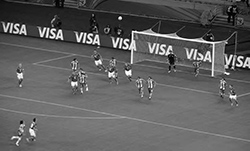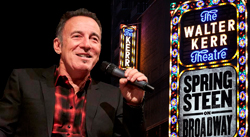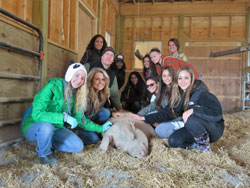The Most Beautiful Game: How Soccer Explains the World is a new First Year Seminar course taught by Assistant Professor of History Maryanne Rhett. With background knowledge in the Middle East and world history, Rhett created the course to teach students about history, while tying in memorable moments from soccer.
“Ninety-nine percent of the class is somehow connected to soccer,” said Rhett. Majority of freshman enrolled in the course include students on the University’s soccer team and fans of the sport.
Kayla Adamson, a student in Rhett’s class, said, “I chose to take this First Year Seminar course because soccer is my life. I’ve been playing ever since I was little and it’s something my whole family enjoys doing. I thought it would be a great class to have for the first semester at college and be a nice transition into the college life.”
Assistant Vice President Bea Rodgers who works with First Year Seminar courses explained that First Year Seminar courses must have academic, ethical and transitional value and the course taught by a full-time professor. First Year Seminar is a general education requirement for students entering the University with 18 credits or less and must be taken during the student’s first semester at the University. Three years ago the three-credit First Year Seminar course replaced the one-credit Freshman Seminar course. “We wanted to add more academic learning for students to make it more beneficial,” said Rodgers.
Instructor of the Sports Communication Minor and History of Sports in the Media, Matthew Harmon said, “I think as someone who has been involved in sports for a long time I’ve always been fascinated how sports reflects life in general.” Harmon went on to explain how the issues of gender, race, religion and business are reflected in the game of soccer. “It hits everything,”said Harmon.
“I think this course is a wonderful addition to the MU curriculum,” said Robert McCourt, the Men’s Soccer Head Coach, “I have travelled the world through soccer and met so many people from different cultures and religions. Soccer globally is the centerpiece of life in most countries. It has affected religion, politics, social values and entire cultures. Our men’s soccer program has been able to experience this first hand with trips to Barcelona, Spain and South Africa.”
Rhett uses online Soccer clips for demonstration during class and last month the students took a trip to see a live game. “My favorite part would definitely be going to the Red Bulls game, it was an amazing experience to be in the same stadium as Thierry Henry and watch the Red Bulls come off with a 4-1 win over Toronto,” said Adamson.
“Sports are a perfect teaching ground,” said Harmon who described how sports in general reflect moments in history, bringing up the time when America beat Russia in the 1980 Olympics after the Cold War.
Harmon said, “I use soccer when we do a comparison of how fans act in different countries using the comparison of soccer to [American] football.” Riots and acts of violence among different groups of fans is one of the topics discussed in his course.
“The class is pretty great so far, the only thing I might add is to make it more modern. We focus a lot on the history of soccer which is great and interesting, but it would be cool to also talk about soccer that is going on now,” said Adamson.
Rodgers said, “This is the only course that does not have a PLA.” Peer Learning Assistant (PLA) acts as a mentor and an assistant to the Professor of the First Year Seminar Course. Students who have taken the course this year can be a PLA next year.
This is the first course to be predominantly built around soccer. “Soccer is so universal,” said Rhett, “I will teach it again in the next two years, I just don’t know when.”




